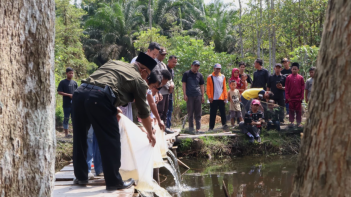London, 4 June 2014 – Speaking at the RSPO European roundtable in London, Dr. Bayu Krisnamurthi, Indonesian Vice Minister of Trade, stated the Indonesian government’s intention to work together with RSPO towards a joint sustainable palm oil standard, which would scale up production of certified sustainable palm oil in Indonesia.
Dr. Krisnamurthi proposed to convert RSPO into an “open source” standard available also for non-RSPO members. Commenting on the target of 100% certified sustainable palm oil, he said “We are building a plane while flying it” and emphasised the need to make sustainable palm oil a viable business to all of Indonesia’s palm oil growers and small-holders.
Entitled “100% Certified Sustainable Palm Oil: Our Shared Responsibility”, the conference brought together over 300 delegates from the UK, Europe, Indonesia, Malaysia, Latin America and other palm oil producing countries to foster greater collaboration among all palm oil stakeholders and to solve the problems of unsustainable palm oil cultivation.
During the conference, Darrel Webber, RSPO Secretary General, announced the first release, in an accessible format, of maps for all RSPO certified palm oil plantations.
The maps are hosted on the new World Resources Institute’s Global Forest Watch Commodities platform. The RSPO maps show exactly where RSPO certified palm oil is produced and together with other data in the GFW platform will empower palm oil buyers to make better decisions that support responsible sourcing.
“By increasing transparency on where and how palm oil is grown, we want to strengthen the role of RSPO as a benchmark to measure everyone’s performance. GFW’s maps will give greater assurance to European buyers that the CSPO they’re sourcing is produced responsibly. They will also act as a tool for certified growers to show their commitment and urge customers to support them.”
By releasing the maps of certified growers, RSPO is answering calls for greater transparency in the supply chain, and increasing trust in its standard to achieve 100% certified sustainable palm oil.
“100% certified sustainable palm oil is really a bold commitment and I am proud to be associated with a movement that goes for 100%”, said in his keynote address Dr. Alan Knight, former Board Member at the Forest Stewardship Council. Dr Knight challenged the RSPO members to overcome tensions between growers, traders and committed buyers to make RSPO a perfectly aligned gear, and urged businesses not to wait for consumers’ demand to deliver certified sustainable palm oil. “If we had waited for customers to ask for FSC, we’d still be at level 1.” Dr Knight also highlighted the importance of traceability, because “if you do not know where your palm oil comes from, you do not care”. Conference speakers agreed on the importance of traceability. However, Cargill’s Trading Director Robert Horster warned against the risk of introducing additional costs into the supply chain.
Yet Sandra Seeboldt, Policy Advisor Private Sector, Oxfam Novib, warned that in reality this debate “is not about the supply chain, but it is about people, forests and animals, and we should not make it too complicated. There is no reason why you cannot source 100% certified sustainable palm oil tonight. You can use GreenPalm certificates. It is not segregated palm oil but is certified sustainable palm oil.”
RSPO’s London conference has inaugurated a series of dialogues for RSPO members to discuss their shared responsibilities in delivering a 100% CSPO market in Europe and reinforce the partnership between growers and palm oil users.
NOTES TO EDITOR:
16% of world's palm oil production is now RSPO certified
The current estimated annual production capacity of RSPO-certified sustainable palm oil is 9.7 million metric tons, approximately 16 percent of global crude palm oil. Spread over 1.97 million hectares of certified production area, about 47.85% of the world's current RSPO-certified sustainable palm oil production capacity comes from Indonesia, followed by 43.95% from Malaysia, and the remaining 8.2% from Papua New Guinea, Solomon Islands, Brazil, Thailand, Colombia, Cambodia and Ivory Coast.
About RSPO
In response to the urgent and pressing global call for sustainably-produced palm oil, the Roundtable on Sustainable Palm Oil (RSPO) was formed in 2004 with the objective of promoting the growth and use of sustainable oil palm products through credible global standards and engagement of stakeholders. The seat of the association is in Zurich, Switzerland, while the secretariat is currently based in Kuala Lumpur with a satellite office in Jakarta.
RSPO is a not-for-profit association that unites stakeholders from seven sectors of the palm oil industry – oil palm producers, palm oil processors or traders, consumer goods manufacturers, retailers, banks and investors, environmental or nature conservation NGOs and social or developmental NGOs – to develop and implement global standards for sustainable palm oil.
Such multi-stakeholder representation is mirrored in the governance structure of RSPO such that seats in the Executive Board and project-level Working Groups are fairly allocated to each sector. In this way, RSPO lives out the philosophy of the "roundtable" by giving equal rights to each stakeholder group to bring group-specific agendas to the roundtable, facilitating traditionally adversarial stakeholders and business competitors to work together towards a common objective and make decisions by consensus.
Contacts for RSPO:
Danielle Morley
European Director for Outreach and Stakeholder Engagement
T: +44 7779 780 737
Email
Stefano Savi
Communications Manager
T: +60 323 021500
Email
Giovanni Colombo
Media relations, Hill+Knowlton Strategies
T: +32 473 844 903
Email
Keep reading

Rowo Ombo: From Neglected Swamp to a Symbol of Hope and Conservation in Jambi, Indonesia

Save the Date: The 22nd General Assembly (GA22) of RSPO Members

Access into prisma

10 Years of RSPO in China: Driving Palm Oil Transformation Towards Sustainability

Updated Trace Function in prisma

Call for Expression of Interest: Independent Investigation of a Complaint

Latin American Smallholders, Key Global Brands Gather in Peruvian Amazon to Advance Sustainable Palm Oil

RSPO Forum for Members and Certification Bodies 2025: Strengthening Capacities and Building Bridges with RSPO Members




